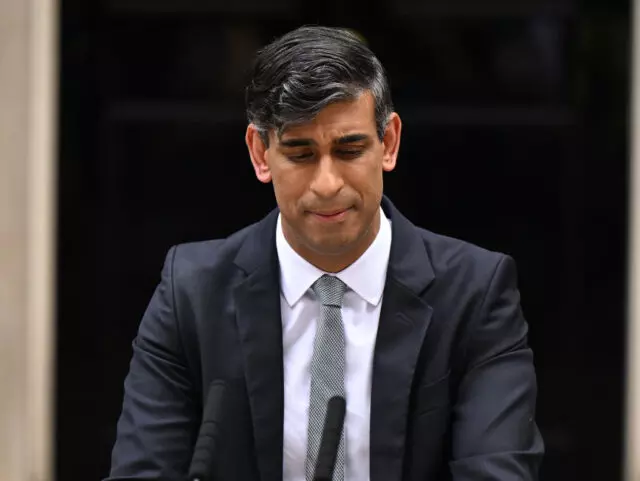The Prime Minister acknowledged the country has given a clear signal that it wants change, and said he would go to King Charles III to tender his resignation. The Prime Minister immediately got in his official car to make the short journey from his official residence to the King’s at Buckingham Palace, just a short walk away.
This event is emblematic of the extraordinary speed and little fuss, by global standards, with which the British government changes. Today, as with most General Elections, the vast majority of seat counts — which are done by hand with paper ballots, often relying on local bank tellers volunteering for their skill at fast counting — and the resignation of the Prime Minister and the appointment of the new one are all done within a single morning.
Britain’s outgoing Prime Minister and leader of the Conservative party, Risihi Sunak, watched by his wife Akshata Murty, delivers a statement after his general election defeat, outside 10 Downing Street in London on July 5, 2024, a day after Britain held a general election. British leader Rishi Sunak conceded defeat Friday to Keir Starmer’s main opposition Labour party in the UK general election, saying, “I take responsibility for the loss.
After Mr Sunak left Buckingham Palace, the United Kingdom is technically briefly left without a government until Sir Keir Starmer, the winner of last night’s vote, arrives by a separate car to meet the King. During this brief period of minutes, the country is under the direct control of the monarch.
Sir Keir won a commanding majority in the commons overnight, taking 412 seats to the Conservatives’ 121. Yet the election is one of the most extraordinary and disproportionate in history: Sir Keir’s Labour appears to have won fewer votes than it did in the last election while doubling its seat count. Meanwhile, Nigel Farage’s Brexit Party got a massive 14 per cent of the vote but was only rewarded with less than one per cent of the seats.
The Liberal Democrats, meanwhile, got a close share of the vote at 12 per cent, yet got 11 per cent of the seats, demonstrating how far Mr Farage’s faction has to go to learn to dominate the UK election system’s quirks before the next election.
As well as leaving the post of Prime Minister, Rishi Sunak also said this morning that, unsurprisingly, he would be resigning from the post of party leader as well. There isn’t much of a Conservative Party left to lead at the moment, but nevertheless he said his departure would be delayed slightly so the arrangements to select a successor could be put in place.

